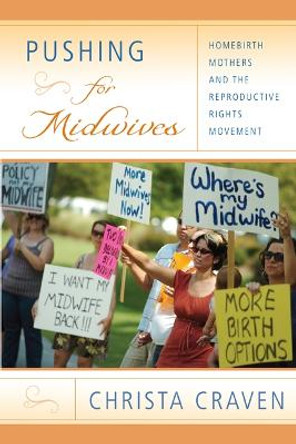Description
About the Author
Wendy Kline is professor and Dema G. Seelye Chair in the History of Medicine in the Department of History at Purdue University. She is the author of Building a Better Race: Gender, Sexuality, and Eugenics from the Turn of the Century to the Baby Boom and Bodies of Knowledge: Sexuality, Reproduction, and Women's Health in the Second Wave.
Reviews
In Coming Home: How Midwives Changed Birth, Wendy Kline offers an engaging read about an important chapter in the feminist health movement and the history of childbirth...Coming Home is a good read and a welcome addition to the growing literature on the American feminist health movement and the history of childbirth. * Paula A. Michaels, Monash University, Bulletin of the History of Medicine *
Kline has written an engaging history of how midwives accomplished this feat in light of the reach and power of institutionalized medicine. Anyone interested in learning where and how babies were born will want to read this book...Kline's book will undoubtedly convince readers that midwives should be at the center of delivering these better outcomes. * Elizabeth Reis, Journal of the History of Medicine and Allied Sciences *
this book could (and probably should) lead to a reconsideration of a medical practice that has altered the beginning of life in this world ... a book that is worth the effort. It should be on permanent display in multiple places * Alain Touwaide, Doody's Reviews *
The publication of Wendy Kline's book is welcome, as it makes a significant contribution to our understanding of how midwifery has developed. Its major strength to me as a midwife is that it takes me back to my roots, reminding me of the fundamentals of the meaning of midwifery * Rosemary Mander, Emeritus Professor of Midwifery, Formerly University of Edinburgh *
In her engaging and well-researched book ... Kline presents a new and necessary chapter in the story of the medicalization of childbirth in the United States: the history of the home birth movement. Kline has a keen eye for entertaining anecdotes and knows exactly when to sprinkle in intriguing biographical details ... We get a real sense of who these midwives were, how they fit within a broader home birth movement, and how, between the 1970s and the present, their practices and Americans' reception of them evolved. More than a history of the home birth movement, Coming Home updates the history of American childbirth and complicates a number of big ideas in the history of modern medicine, making it a terrific addition to the field of women's health ... A new starting point for the history of childbirth. * Kelly O'Donnell, Nursing Clio *
The real critical strength of Coming Home is the authors ability to read beyond midwives professional gains, examining their influence on traditional medicine, spiritual movements, psychiatry, civil rights, and the public imagination. * Audrey Farley, Marginalia *
Kline offers a rich and complicated history of direct entry midwifery and the twentieth-century American homebirth movement ... At the core of Kline's thesis is that in each locale where women were called into midwifery, they collaborated with physicians. These women saw childbirth as requiring much more than medical technology, yet they recognized it had its place, and thus sought out or welcomed unsolicited supportive medical advisers and teachers. * Jennifer Block, Midwifery Today *
Book Information
ISBN 9780190232511
Author Wendy Kline
Format Hardback
Page Count 264
Imprint Oxford University Press Inc
Publisher Oxford University Press Inc
Weight(grams) 544g
Dimensions(mm) 163mm * 239mm * 25mm




